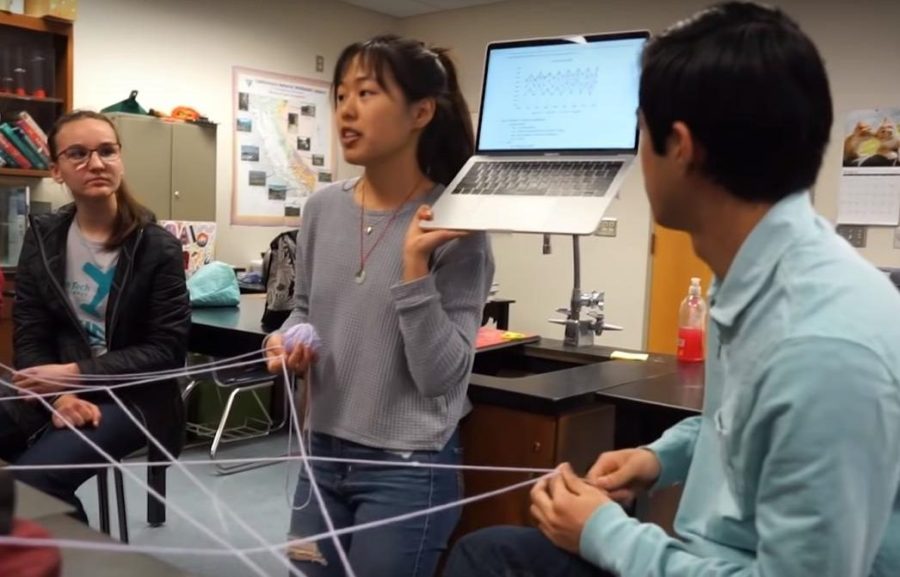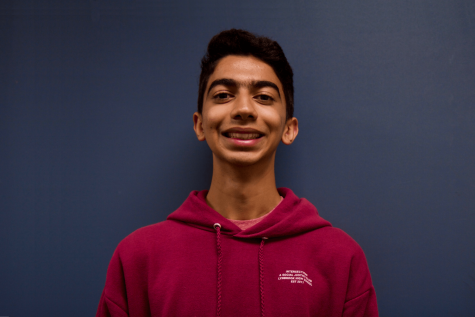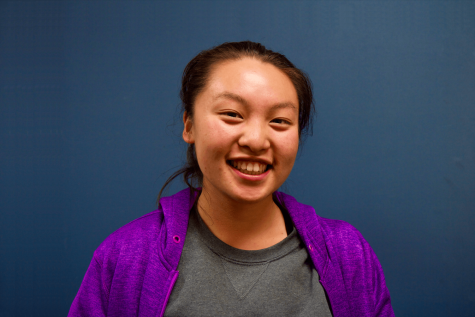Amber Lee: Transforming struggles into social change
Lee leads a discussion in her club, Intersections.
February 7, 2019
Standing at the top of the quad in front of a large crowd of students and staff, microphone in hand, Class of 2018 alumna Amber Lee commences the Lynbrook High Walkout with a passionate speech.
“We do have a problem, but more importantly we have the intellect, the leadership capability, the courage, but also the right to demand a solution,” she said, addressing the recent school shootings occurring throughout the United States. “We’re stepping out, not just for our generation, but for generations to come.”
This is the same passion that she carried when leading Intersections: A Social Justice Club.
In little more than a year since Lee founded it, Intersections has greatly impacted Lynbrook. The club aims to stimulate discussions on topics that are not typically addressed in the school environment, thus promoting tolerance and fostering activism. Meetings include interactive activities through which the club tackles topics including intersectionality, mental health, race, gender, allyship, toxic relationships and sex ed. Officers have also organized events such as “Bloom,” with student speakers including Lynbrook alumnus Kai Tsao and Irvington High School senior Colleen Li, to spread awareness about mental health by inviting all Bay Area students to attend.
Lee first decided to establish the club when she discovered the lack of a safe space for discussions on such issues at Lynbrook while supporting others through their personal struggles.
“I wanted to create a space that was safe for people to just be honest and let their guard down and be real, because I don’t think anyone is a ‘typical Lynbrook student,’” Lee said. “Everyone has struggles. On top of that, we should challenge ourselves to recognize and support other people’s challenges even if we don’t personally know them. I had a fear of being honest, a fear of starting a social justice club and putting myself out there, but I knew I had to do it, because otherwise I wouldn’t be genuine.”
Currently pursuing her undergraduate degree in public policy analysis with a concentration in economics at Pomona College, Lee officially founded the club in the second semester of her junior year, although her desire to start the first social justice club on campus ignited well before it was passed. From middle school through high school, Lee struggled with mental health issues and eating disorders.
“I remember students and teachers making fun of me for my body, and it was not a good time,” Lee said. “I felt like a stigma. I felt judged because I was and still am a very emotional and sensitive person. It’s a very lonely and misunderstood experience. It felt like other people would never understand my mental health problems.”
Although she felt like no one would be able to relate to her, Lee wanted to reach out and see if there were other people who could understand her experiences, trying to burst the bubble of isolation when it comes to personal experiences.
“I didn’t feel fully safe, even in the Lynbrook community, because I knew and experienced certain things that other people haven’t,” Lee said. “I realized that I definitely couldn’t be the only one, and there are experiences that are much worse than mine that people have to endure through in this community. If that’s the case in our isolated bubble, then what about stepping outside? How many more experiences and perspectives are we blinded to?”
Challenging herself to overcome her obstacles, Lee used therapy as a tool to improve her mental stability.
“I was assigned a social worker for seven months in eighth grade for self harm,” Lee said. “I did not like meeting her, and I didn’t think I was getting anything out of it because I was suspicious and dealing with problems in an unhealthy way. My sophomore year, I tired myself by playing a video game for five hours straight, and that’s when I realized something was wrong with me. So, I started therapy again at the beginning of senior year.”
While therapy may be stigmatized, as it was for Lee herself in the beginning, she is not afraid to openly share her experiences with therapy, which ultimately helped her take care of her mental health.
“I’m not ashamed at all to say that I was going to therapy,” Lee said. “When I was a sophomore, I was able to open up to therapy and trust the expertise that was given to me. From then on, I’ve gotten a lot better at regulating my emotions and dealing with unhealthy thoughts. I’m glad I overcame my own stigma against mental health and illness, helping me embrace techniques to handle it.”
Lee’s personal struggles set the foundation for a social justice club that aimed to focus on and tackle social issues on a broader scope, just as much as on an individual level. After Michael Brown was shot by a police officer in 2014, sparking the Ferguson ‘Black Lives Matter’ rallies, then-freshman Lee was greatly impacted, which ignited Lee’s passion for social justice and activism.
“I realized how unjust it was for the police to try to suppress those protests just like they did during the civil rights movement,” Lee said. “I had no idea about police brutality statistics until then. I wanted to challenge myself to open my perspectives more, since we’re in such an insulated community and we don’t know much of what’s going on.”
When Lee tried proposing the club her sophomore year, it was not passed, one of the major concerns being that the club was too focused on spreading radical beliefs.
“Just as you wouldn’t target other religious and philosophical clubs for spreading what they believe in, you shouldn’t single out Intersections as being too ‘radical’ or too ‘social justice warrior,’” Lee said. “The point of the club is to develop your own beliefs but also to recognize and respect other people’s perspectives.”
The club has already impacted Lynbrook’s culture, with one of its highlights being the Lynbrook High School Walk-Out on March 14, 2018. Through her struggles, hard work and passion, Lee would like to impart what she has learned with Lynbrook students.
“There are so many unspoken rules that we have at school, so what you choose to follow should be an active decision you’re making,” Lee said. “Try to be fearless with what you’re passionate about. Embrace the challenges of fulfilling a goal. Treat other people how you personally want to be treated. And most importantly, be aware of the impact that you have on other people.”





































































